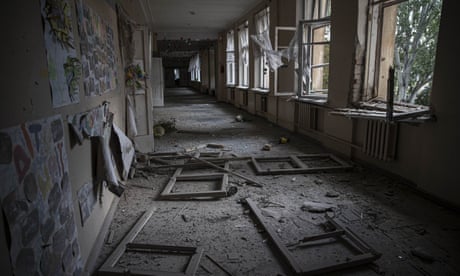At least eight Russian warplanes appear to have been damaged or destroyed in the recent attack on Saky airbase in Crimea, according to newly released satellite images.
On Wednesday Kyiv said that nine Russian aircraft were destroyed on the ground following Tuesday’s dramatic explosions at the Saky airbase, which Russia said killed one, wounded 14 and damaged dozens of nearby houses.
Kyiv has so far officially denied responsibility for the attack, with an adviser to President Volodymyr Zelenskiy suggesting partisans might have been involved.

Russia has also sought to downplay the attack, denying that any aircraft were damaged in the blasts and conceding only that “several aviation munitions detonated” in a storage area at the facility.
However, satellite photos appear to show multiple fighter planes at the military base in Novofedorivka blown up with new evidence suggesting the possibility of a targeted attack.
The images, from the US-based Planet Labs, show large areas of scorched earth and damage to the runway alongside the charred remnants of military aircraft.
Images taken by the private satellite operator at around 8am on 9 August – approximately four hours before the attack – and about 4.40pm on 10 August, show at least eight aircraft parked outside were damaged or destroyed.
The before-and-after images are the first independent confirmation of damage to the base, prompting questions about how a location more than 100 miles (160km) from the frontline could have been attacked.
Eliot Higgins, founder and director of open source investigative website Bellingcat, said he “can’t think of a time Russia has lost this many air assets in one day in recent memory” in a series of tweets on Thursday.
Higgins also noted: “I can make out three craters, at sites that appear to be used for storage, so it could be they were targeted and everything else was destroyed when whatever was stored there went up.”
“One way to interpret those craters is precise strikes from a long range munition,” he said, adding that the craters appeared the measure “about 20-25m wide … which would mean a pretty big munition”.
“One thing that does stand out is there’s no impacts visible that look like they could be misses, so either they used very accurate weapons or they got very lucky.”
The British defence secretary, Ben Wallace, told the BBC the UK was still trying to establish facts on the airbase explosions, but added that he believed it was unlikely western weapons were involved. The airbase, he argued, was a legitimate target for Ukraine’s armed forces.
Political sources in Ukraine have said the country had carried out the attack – but no public claim of responsibility was made by Kyiv.
The Saky airbase is home to Su-30M fighters, Su-24 bombers and the Il-76 transporter, used regularly to launch missile strikes on Ukraine and patrol the Black Sea and surrounding area.
Crimea is internationally recognised as part of Ukraine but was seized by Moscow in 2014. It holds huge strategic and symbolic significance for both sides. The Kremlin’s demand that Ukraine recognise Crimea as part of Russia has been one of its key conditions for ending the fighting, while Ukraine has vowed to drive the Russians from the peninsula and all other occupied territories.
Ukrainian presidential adviser Oleksiy Arestovych cryptically said that the blasts were either caused by Ukrainian-made long-range weapons or the work of Ukrainian guerrillas operating in Crimea.
Ukrainian military analyst Oleh Zhdanov said: “Official Kyiv has kept mum about it, but unofficially the military acknowledges that it was a Ukrainian strike.”
Ukraine’s public coyness about the attack is partly designed to preserve some ambiguity about the means used, sources said, prompting broad speculation as to how Kyiv was able to strike so deep behind Russian lines, in one of the first attacks on Crimean soil since the Russian invasion began in February.
Justin Bronk, an aviation analyst with the Rusi thinktank, said that, having studied social media videos of the incident, he could see no evidence of incoming missiles and that he was “almost certain” there were “secondary explosions” of ammunition stores or fuel bunkers which were stored on or near the airstrip.
That led him to conclude that “the most likely current theory for me is that Ukrainian special forces carried out the attack by infiltrating close enough to the base to launch and guide in small UAVs [drones] or loitering munitions, to hit either parked aircraft or fuel trucks/storage”.
The Washington-based Institute for the Study of War said it couldn’t independently determine what caused the explosions but noted that simultaneous blasts in two places at the base probably rule out an accidental fire but not sabotage or a missile attack.
But it added: “The Kremlin has little incentive to accuse Ukraine of conducting strikes that caused the damage since such strikes would demonstrate the ineffectiveness of Russian air defence systems.”
The Associated Press contributed to this report.
The Lagos State Internal Revenue Service (LIRS) has issued a reminder to all…
Fikayo Soyombo, founder of the Foundation for Investigative Journalism (FIJ), took on the…
Oyo State Governor, Seyi Makinde, has expressed deep sorrow over the tragic stampede that claimed the…
The economic reforms of the Tinubu administration, including the market-based pricing of premium motor spirit…
The Governor of Imo State, Hope Uzodinma has appealed to unknown gunmen still hiding in…
Germany has made significant changes to its immigration system, introducing new pathways for skilled professionals…